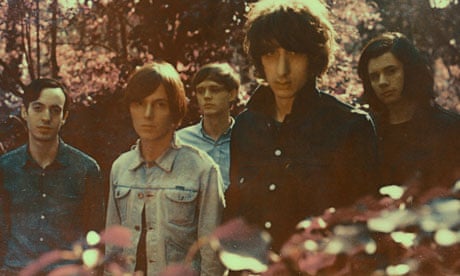In his new book, Retromania, the critic Simon Reynolds revisits his damning mid-80s coinage "record collection rock". Inspired by the relentless forward march of post-punk, the young Reynolds was sceptical of bands such as Primal Scream or Spacemen 3, who waved their influences like a flag: "music," as he once defined it, "where the listener's knowledge of prior rock music is integral to the full aesthetic appreciation of the record." It's a nice concept, but one that's in the eye of the beholder. If a band have a broad enough spectrum of influences and adapt or combine them in clever, compelling ways, then an audience not necessarily versed in those influences will take them at face value. In the worst cases, a candidly celebrated record collection feels like a cage; in the best it's a door.
When the Horrors emerged, in a cloud of dry ice, from Southend six years ago, it was difficult to tell which way they were heading. Looking like gravediggers and sounding like cratediggers, they were passionately devoted to Joe Meek, the Birthday Party, the Cramps and outré garage rock (they covered the Sonics and Screaming Lord Sutch), and they didn't mind who knew it. With costumes, pseudonyms and artwork to match the music, their 2007 debut album Strange House felt so conceptually neat that it might have been an airlock. Add to that the mixed blessing of music-press hype and you had a young band with everything to prove.
That made 2009's Mercury-nominated Primary Colours a dream of a second album. You could still hazard a strong guess at the records on the quintet's shelves (they have a distinct, old-fashioned aroma of vinyl rather than downloaded Zip files) but they struck you as less important than the overall mood, which managed to be at once brooding and euphoric. A similar confidence radiated from frontman Faris Badwan's recent side-project, Cat's Eyes, a gothic girl-group song cycle that sounded both recognisable and uncanny, like a familiar face glimpsed, out of context, in a dream.
Primary Colours' chrysalis-to-butterfly transformation benefited from low expectations, but after a few listens the self-produced Skying feels like an equally impressive advance, one that announces the Horrors' arrival as one of the best bands in the country. One marker of their progress is that a couple of songs (including the single Still Life) recall Simple Minds, and not the hip, frozen-veined, post-punk Simple Minds of Empires and Dance either. Now, it's just about possible that one member came in one day with a battered 7in of Don't You (Forget About Me) and said, "Listen to this, it'll blow your minds," but it feels more like a fluke collision between Faris Badwan's sonorous baritone, those symphonic 80s synthesisers that sound like collapsing ice shelves, and the band's never-better grasp of how to craft handsome, dramatic pop songs.
So the superficial echoes of the Chameleons, the Psychedelic Furs and John Hughes's anglophile high-school movie soundtracks feel almost accidental. The album's restless dynamism owes much more to the escapist rush of dance music and the muscular end of shoegazing. Endless Blue opens like the Cure lazing on a riverbank before an amp-bursting explosion of guitars as sudden and effective as a horror-movie twist. Wild Eyed melts woozily into reversed loops and chirpy brass. The magnificent trance-rock centerpiece Moving Further Away even explores some of the same territory as the Chemical Brothers or LCD Soundsystem. During its long, dizzying breakdown, synthesisers duel with a sample of a flock of seagulls (not, let's be perfectly clear, A Flock of Seagulls), before the band crash back in for a hammering finale. The music sounds vast, yet interior, as if its ideal venue weren't an arena or a festival field, but an expanding head.
Skying's starry-eyed, cosmic leanings are complicated by Badwan's slippery, sepulchral presence. He's the skull at the happening. When he's not singing about skies and oceans, or delivering ecstatic commands to "open your eyes" (Changing the Rain) or declaring "the moment that you want is coming if you give it time" (Still Life), he can sound paranoid and vengeful. I Can See Through You routes the emotional cruelty of the Cat's Eyes album via a bad acid trip, taunting: "No one remembers your name, no one tries." He sounds almost deranged on Monica Gems, an itchy, urgent racket that suggests glam-rock produced by Kevin Shields.
Such shorthand descriptions are hard to avoid entirely, and music buffs might still want to play spot the influence with Skying – one reviewer detected seven in the opening song alone – but that would undersell this marvellous record, which should be every bit as exciting to a listener who knows none of those reference points. So never mind the past: the records the Horrors love aren't destinations, but signposts to an exhilarating future.




Comments (…)
Sign in or create your Guardian account to join the discussion